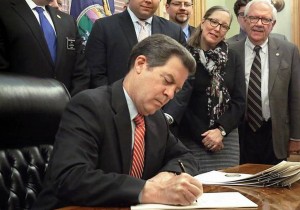A little over a week ago we blogged about the history of how right to carry laws were adopted in a stepwise fashion across the nation. Then just last week Kansas became the sixth state to take the next and final step toward affirming the Second Amendment’s true spirit—codifying the right to carry a concealed firearm for self-protection without first having to ask permission from the government. The first wave of right to carry legislation ended just two years ago, when Illinois won the dubious distinction of being the last state to adopt a right to carry law, forced by federal courts into compliance with 21st century civil rights. It is fitting then, that the next wave, constitutional carry, had already begun.
As the 26-year experiment of concealed carry laws proceeded, the citizens of some of our freer states decided the next logical step was to remove needless procedural and political barriers to concealed carry and enact what we call constitutional carry (also known as Vermont carry). Vermont was the original state where law-abiding citizens could legally carry without a permit from the government, and proving the naysayers wrong, it has long enjoyed a low violent crime rate. So far Alaska, Arizona, Arkansas, Wyoming, and now Kansas have eliminated their statutory requirements for licensure to carry a concealed firearm for self-protection. Several other states are actively considering doing the same, others have provisions for unlicensed open carry, and a half dozen or so other states have enacted some limited form of unlicensed carry. In none of these states has the elimination of a licensing requirement resulted in increased crime. And why would anyone expect it to, given the highly enlightening results of the great concealed carry experiment?
Americans increasingly believe in the value of firearms as security tools, and this practical wisdom is buttressed by increasing realization of its corollary—that gun ownership provides protection against tyranny. The growing evidence that concealed carry license holders are a cut above the average in responsibility and courage must have everything to do with this national change in the politics of gun ownership. It seems obvious that criminals would not submit themselves to the intrusive, often expensive, and too-often arbitrary process of a thorough background check by the state department of justice, fingerprinting, letters of recommendation, endless paperwork, and range qualification that are part of the typical license application process. Only the most motivated, most trustworthy people would jump through these hoops. After 26 years of one positive experience after another, the public seems ready to believe what they see.
This great movement toward freedom in American politics only highlights the civil rights outliers—places like California, New York, and inexcusably, our nation’s capital. Even as Governor Brownback signed the Kansas constitutional carry law last week, California’s legislature considered a bill to make licensing more complicated and arbitrary than it already is in the Golden State. Politicians in New York and the District of Columbia have made no secret of their wish to extinguish the right to keep and bear arms. But such retrograde policies cannot thrive in the path of the freedom wave rolling across America. More states will see the overwhelming success of concealed carry and the good Americans who made it happen, and they will increasingly choose freedom in the form of constitutional carry laws.
As the great politician Lincoln observed, “…public sentiment is everything. With public sentiment, nothing can fail; without it nothing can succeed. Consequently he who moulds public sentiment, goes deeper than he who enacts statutes or pronounces decisions. He makes statutes and decisions possible or impossible to be executed.”
Those states that are civil rights laggards will find themselves increasingly isolated and out of touch with free America. Public sentiment will, at last, force them to change too.
—Timothy Wheeler, MD is director of Doctors for Responsible Gun Ownership, a project of the Second Amendment Foundation.


